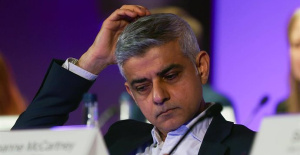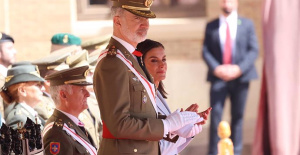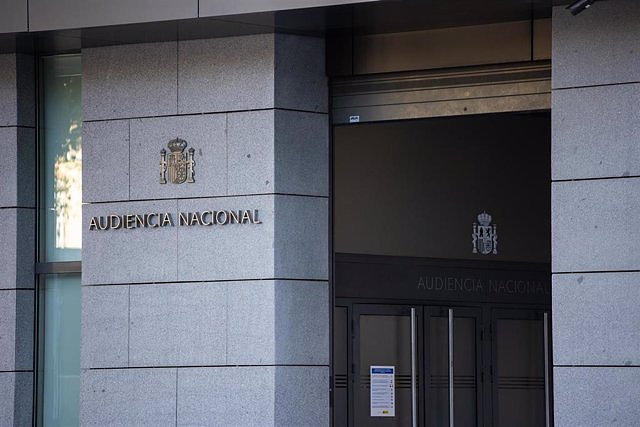The magistrate will also investigate the possible responsibility of the defendants in the policy of forced expulsions in the Basque Country
The judge of the National Court Alejandro Abascal has agreed to investigate the alleged responsibility of 10 former leaders of the terrorist organization ETA in the murder on June 4, 2000 of the PP councilor in the Durango City Council (Vizcaya) Jesús María Pedrosa Urquiza as well as the possible responsibility of the defendants in the policy of forced expulsions in the Basque Country.
In an order from this same Monday, to which Europa Press has had access, the person in charge of the Central Court of Instruction Number 1 admits for processing the complaint filed last August by the Dignity and Justice Association, which explained that Pedrosa was "a of the numerous victims" of the "policy of forced expulsions from the Basque Country directed by the zuba -the highest leadership body of ETA-- under threat of death".
Therefore, the judge agrees to investigate for a crime of murder in connection with a consummated crime of coercion and terrorist threats to the leaders of the gang at the time of the events: Javier García Gaztelu, alias 'Txapote'; Ignacio Miguel Gracia Arregui, alias 'Iñaki de Rentería'; Juan Antonio Olarra, alias 'Juanvi'; Juan Carlos Iglesias Chouzas, 'Gadhafi'; Asier Oyarzabal, alias 'Baltza'; María Soledad Iparraguirre, 'Anboto'; Miguel Albisu Iriarte, 'Mikel Antza'; Vicente Goicoechea, aka 'Willy'; Ainhoa Múgica, alias 'Olga' and Ramon Sagarzazu, alias 'Ramontxo'.
The magistrate endorses DyJ's complaint and explains that over the years the ETA executive committees have directed the policy of forced expulsions of different sectors of the non-nationalist Basque population, through coercion and threats that progressively expanded and individualized on the citizens who exercised democratic civic resistance against the gang.
It was in this context that the organization ended the life of Jesús María Pedrosa Urquiza in the town of Durango, when he was walking back to his home. An ETA member approached him from behind and shot him in the neck, killing him almost instantly. A second terrorist, also unidentified, picked up the perpetrator of the attack in a vehicle and both fled.
For the magistrate, the murder of Pedrosa is not only a terrorist murder. "It also supposes an amplification and a reinforcement of that terrorist threat, forming part of that continued and not punctual, indiscriminate and persistent strategy of terror, until the year 2011, and with that it not only ends the life of the specific person , in this case Mr. Pedrosa Urquiza, but rather that climate of threat created with the vocation of lasting over time is fed," he says.
In his car, Abascal explains that since the early 1980s, ETA had a hierarchy in which its leadership or executive committee assumed all management functions and, consequently, decision-making to carry out a terrorist action, applying the strategy designed by the executive committee, they were distributed to all the militants.
"The executive committee decides, coordinates, selects the objectives, sends the information, delivers the necessary material to attack, generically designates the objective and expressly orders the attack to be carried out," the instructor asserts.
In this regard, the investigator maintains that the threats that the councilor received before his death and his subsequent execution "evidence the insolvency and connection between the attempted expulsion and the murder that occurred, as the terrorist organization itself claimed." in ZUZEN 79 (against the politicians responsible for the crushing of Euskal Herria").
REQUEST REPORTS FROM THE CIVIL GUARD AND NATIONAL POLICE
For all this and to clarify the murder of the councilor, the magistrate agrees to carry out a series of proceedings to clarify the responsibility of the members of the ETA Executive Committee at the time of the murder of Jesús María Pedrosa.
Among them, it requests the Civil Guard and the National Police a report that includes the actions of threats, coercion and harassment committed against militants of constitutionalist political parties in the period of time immediately before, simultaneously and after the assassination of the councilor in June 2000. , "and it must be specifically evaluated whether, as a consequence of this intimidating climate, these people were able to leave the Basque Country".
The purpose of these proceedings, the magistrate details, is to determine the presumed participation of the former ETA leaders in the coercion, threats and subsequent murder, either as direct perpetrators or as those responsible for the crime committed by the terrorist organization in commission by omission.
THE COMPLAINT OF DIGNITY AND JUSTICE
It was last August when Dignity and Justice filed a 247-page complaint before the Central Investigating Court Number 1 of the National Court to request that it investigate not only the murder, one of the ETA crimes that remain unresolved, but also the alleged coercion and terrorist threats against Pedrosa Urquiza as part of "the broadest policy of forced expulsion of between 60,000 and 200,000" people from the Basque Country.
In it, the association assures that the "forced expulsion attempt" was inserted in "a long and very extensive policy that zuba to zuba had been perpetuating since the end of 1977" and that this was "determinant" in the murder of the councilor .
In this sense, DyJ defended that the member of the PP was "selectively assassinated" before his "unique civic and heroic resistance to flee Durango." For Dignity and Justice, the death of Pedrosa Urquiza was a "direct" consequence of his resistance to said expulsion policy and became a "monstrous instrumental crime, exemplary, lenitive, for others who might think of resisting." .
Within the framework of the complaint, Dignidad y Justicia relied on the jurisprudence of the Supreme Court, which contemplates "mediate authorship by domain of the organized apparatus of power", to demand that the National Court admit their petition and investigate the murder of the popular councillor.

 Exploring Cardano: Inner Workings and Advantages of this Cryptocurrency
Exploring Cardano: Inner Workings and Advantages of this Cryptocurrency Seville.- Economy.- Innova.- STSA inaugurates its new painting and sealing hangar in San Pablo, for 18 million
Seville.- Economy.- Innova.- STSA inaugurates its new painting and sealing hangar in San Pablo, for 18 million Innova.- More than 300 volunteers join the Andalucía Compromiso Digital network in one month to facilitate access to ICT
Innova.- More than 300 volunteers join the Andalucía Compromiso Digital network in one month to facilitate access to ICT Innova.-AMP.- Ayesa acquires 51% of Sadiel, which will create new technological engineering products and expand markets
Innova.-AMP.- Ayesa acquires 51% of Sadiel, which will create new technological engineering products and expand markets Khan is re-elected mayor of London and underpins Labor's victory in local elections
Khan is re-elected mayor of London and underpins Labor's victory in local elections Felipe VI swears the flag again 40 years later at the AGM with Princess Leonor as a witness
Felipe VI swears the flag again 40 years later at the AGM with Princess Leonor as a witness Freixenet and unions agree to reduce working hours by 20-50% this year due to the drought
Freixenet and unions agree to reduce working hours by 20-50% this year due to the drought STATEMENT: Nearly 400 people participate in the II Family Support Conference at UIC Barcelona
STATEMENT: Nearly 400 people participate in the II Family Support Conference at UIC Barcelona How Blockchain in being used to shape the future
How Blockchain in being used to shape the future Not just BTC and ETH: Here Are Some More Interesting Coins Worth Focusing on
Not just BTC and ETH: Here Are Some More Interesting Coins Worth Focusing on A sensor system obtains the fingerprint of essential oils and detects if they have been adulterated
A sensor system obtains the fingerprint of essential oils and detects if they have been adulterated Faraday UPV presents the 'Origin' rocket to exceed 10 km of flight: "It is the beginning of the journey to space"
Faraday UPV presents the 'Origin' rocket to exceed 10 km of flight: "It is the beginning of the journey to space" The Generalitat calls for aid worth 4 million to promote innovation projects in municipalities
The Generalitat calls for aid worth 4 million to promote innovation projects in municipalities UPV students design an app that helps improve the ventilation of homes in the face of high temperatures
UPV students design an app that helps improve the ventilation of homes in the face of high temperatures A million people demonstrate in France against Macron's pension reform
A million people demonstrate in France against Macron's pension reform Russia launches several missiles against "critical infrastructure" in the city of Zaporizhia
Russia launches several missiles against "critical infrastructure" in the city of Zaporizhia A "procession" remembers the dead of the Calabria shipwreck as bodies continue to wash up on the shore
A "procession" remembers the dead of the Calabria shipwreck as bodies continue to wash up on the shore Prison sentences handed down for three prominent Hong Kong pro-democracy activists
Prison sentences handed down for three prominent Hong Kong pro-democracy activists ETH continues to leave trading platforms, Ethereum balance on exchanges lowest in 3 years
ETH continues to leave trading platforms, Ethereum balance on exchanges lowest in 3 years Investors invest $450 million in Consensys, Ethereum incubator now valued at $7 billion
Investors invest $450 million in Consensys, Ethereum incubator now valued at $7 billion Alchemy Integrates Ethereum L2 Product Starknet to Enhance Web3 Scalability at a Price 100x Lower Than L1 Fees
Alchemy Integrates Ethereum L2 Product Starknet to Enhance Web3 Scalability at a Price 100x Lower Than L1 Fees Mining Report: Bitcoin's Electricity Consumption Declines by 25% in Q1 2022
Mining Report: Bitcoin's Electricity Consumption Declines by 25% in Q1 2022 Oil-to-Bitcoin Mining Firm Crusoe Energy Systems Raised $505 Million
Oil-to-Bitcoin Mining Firm Crusoe Energy Systems Raised $505 Million Microbt reveals the latest Bitcoin mining rigs -- Machines produce up to 126 TH/s with custom 5nm chip design
Microbt reveals the latest Bitcoin mining rigs -- Machines produce up to 126 TH/s with custom 5nm chip design Bitcoin's Mining Difficulty Hits a Lifetime High, With More Than 90% of BTC Supply Issued
Bitcoin's Mining Difficulty Hits a Lifetime High, With More Than 90% of BTC Supply Issued The Biggest Movers are Near, EOS, and RUNE during Friday's Selloff
The Biggest Movers are Near, EOS, and RUNE during Friday's Selloff Global Markets Spooked by a Hawkish Fed and Covid, Stocks and Crypto Gain After Musk Buys Twitter
Global Markets Spooked by a Hawkish Fed and Covid, Stocks and Crypto Gain After Musk Buys Twitter Bitso to offset carbon emissions from the Trading Platform's ERC20, ETH, and BTC Transactions
Bitso to offset carbon emissions from the Trading Platform's ERC20, ETH, and BTC Transactions Draftkings Announces 2022 College Hoops NFT Selection for March Madness
Draftkings Announces 2022 College Hoops NFT Selection for March Madness
























